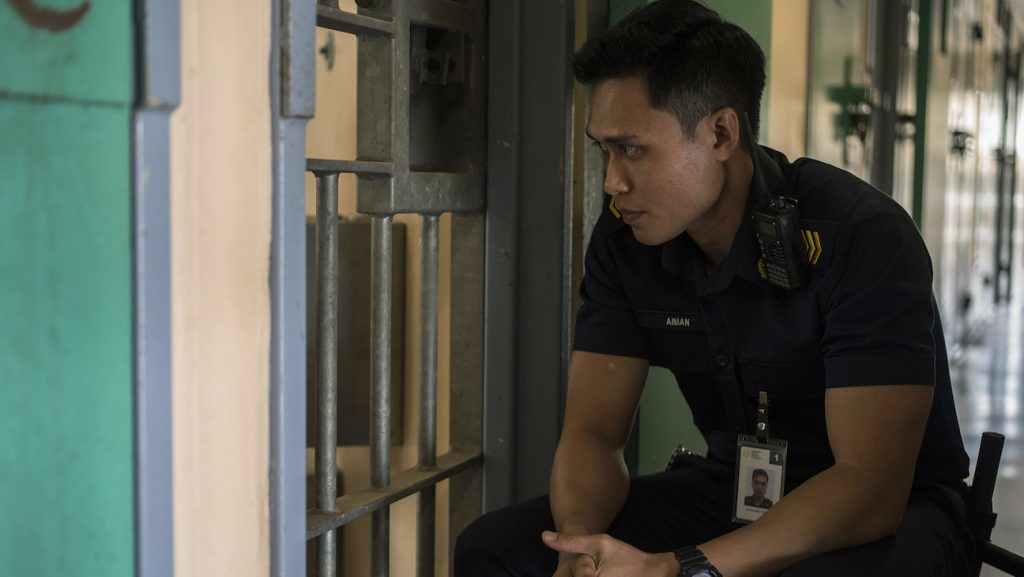APPRENTICE
Film Movement
Reviewed by: Harvey Karten, Shockya
Grade: B+
Director: Boo Junfeng
Written by: Boo Junfeng
Cast: Fir Rahman, Wan Hanafi Su, Mastura Ahmad, Koh Boon Pin, Nickson Cheng, Crispian Chan, Gerald Chew
Screened at: Review 1, NYC, 2/21/17
Opens: March 3, 2017
Ironically, as America moves to the left, the country votes to the right. Gains have been made in race relations, civil liberties, civil rights, voting rights, LGBTQ rights and reproductive rights, but the U.S. is the only country in the highly developed West to retain capital punishment, at least in some states. Why so, even though studies have repeatedly stressed that the death penalty does not deter murder? Instead of polling people who, in the comfort of their homes sip bourbon and spout their political opinions, Boo Junfeng, who directs “Apprentice,” polls the individual who could say, “The buck stops here.” That person is the one who springs the trapdoor, pulls the switch, releases the gas, or delivers the deadly injection to the condemned. “Apprentice” focuses on two executioners’ point of view, discovering that both deliver their deadly trade with a measure of doubt.
Boo, whose first feature-length film “Sandcastle” deals with an 18-year-old who learns a secret about his father, shows a director who is still contrasting the older and younger generations with “Apprentice.” Here, young Sergeant Aiman Yusof (Fir Rahman) is learning the ropes from a Singapore prison’s chief hangman, Rahim (Wan Hanafi Su) (“I cannot take credit for the “learning the ropes” wordplay: that’s in the dialogue). Aiman has a generally hostile relationship with his older sister, Suhaila (Mastura Ahmad), accusing her of wanting to marry a man only because the groom-to-be will get her out of Singapore into Australia. He’s a lonely fellow for another reason. His father, whom he never knew, was hanged for a grisly murder, and he looks upon executioner Rahim as a father substitute. Consider it an irony, if you will, but this father substitute also pulled the lever that hanged the young man’s dad, and the assistant, or apprentice, may even be fired for failure to disclose his father’s fate.
But never mind: Rahim, who bonds with Aiman, is impressed enough with the shy man’s demeanor and his assistance with an execution that he appoints Aiman as his assistant, a stepping-stone to a fast-track appointment to replace him.
“Apprentice” is about a fellow who does not say “You’re fired,” but who could theoretically think “you’re dead” as he conducts his job. The bleak, murky prison scenes are filmed in Australia as the subject matter would not please officials in Singapore. The city-state has severe laws for capital offenses, considering drug smuggling to be subject to the death penalty. Recently Singapore executed several foreigners for just that offense, bringing down the condemnation of arguably more civilized countries.
In preparing the film, the crew of “Apprentice” studied the subject for five years, employing Alan Shadrake’s book “Once a Jolly Hangman” as principal print enlightenment. (The book, which has no reviews on Amazon, is for sale for just $598.99 but don’t forget the $3.99 shipping cost. And that’s for a used copy.) You can learn the subject for less than that on the big screen, and what’s more the film seems authentic since it is based largely on an interview with Darshan Singh, who executed up to 18 convicts a day.
I don’t know that this film should be considered a broadside against capital punishment. At least in Adrian Shergold’s British movie “Pierrepont: The Last Hangman,” the title figure Albert Pierrepont had enough doubts about his job that during a long career, he decided that capital punishment does not work and got out of the field. And that’s a guy who put the rope on the necks of Nazi war criminals that should have received an ever worse penal fate.
The atmosphere of “Apprentice” is minimalist, largely dark areas of the prison where Rahim shows kindness to the condemned on their penultimate days, delivering nice clothes for the inmates to wear for the hanging. Aiman, however, has his own view, accusing the chief of a faux kindness offered simply to make the job easier.
The film received an eight-minute standing ovation at Cannes, motivated perhaps by the journalists’ cri de coeur against the death penalty, yet my own impression is that the severity of Singapore’s laws does not have much an input in the movie. You have learn on your own how rigidly that small country interprets crimes like drug smuggling, a crime that in the Philippines these days evokes executions of the criminals by law enforcers right on the street. Benoit Soler is behind the lens of an Arri Alexa but is partly responsible for too literal an impression of the story. For a more melodramatic one, you’d do well to take in Jacques Audiard’s “A Prophet.”
Unrated. 96 minutes. © Harvey Karten, Member, New York Film Critics Online
Comments, readers? Agree? Disagree? Why?
Story – B
Acting – B+
Technical – B
Overall – B+

